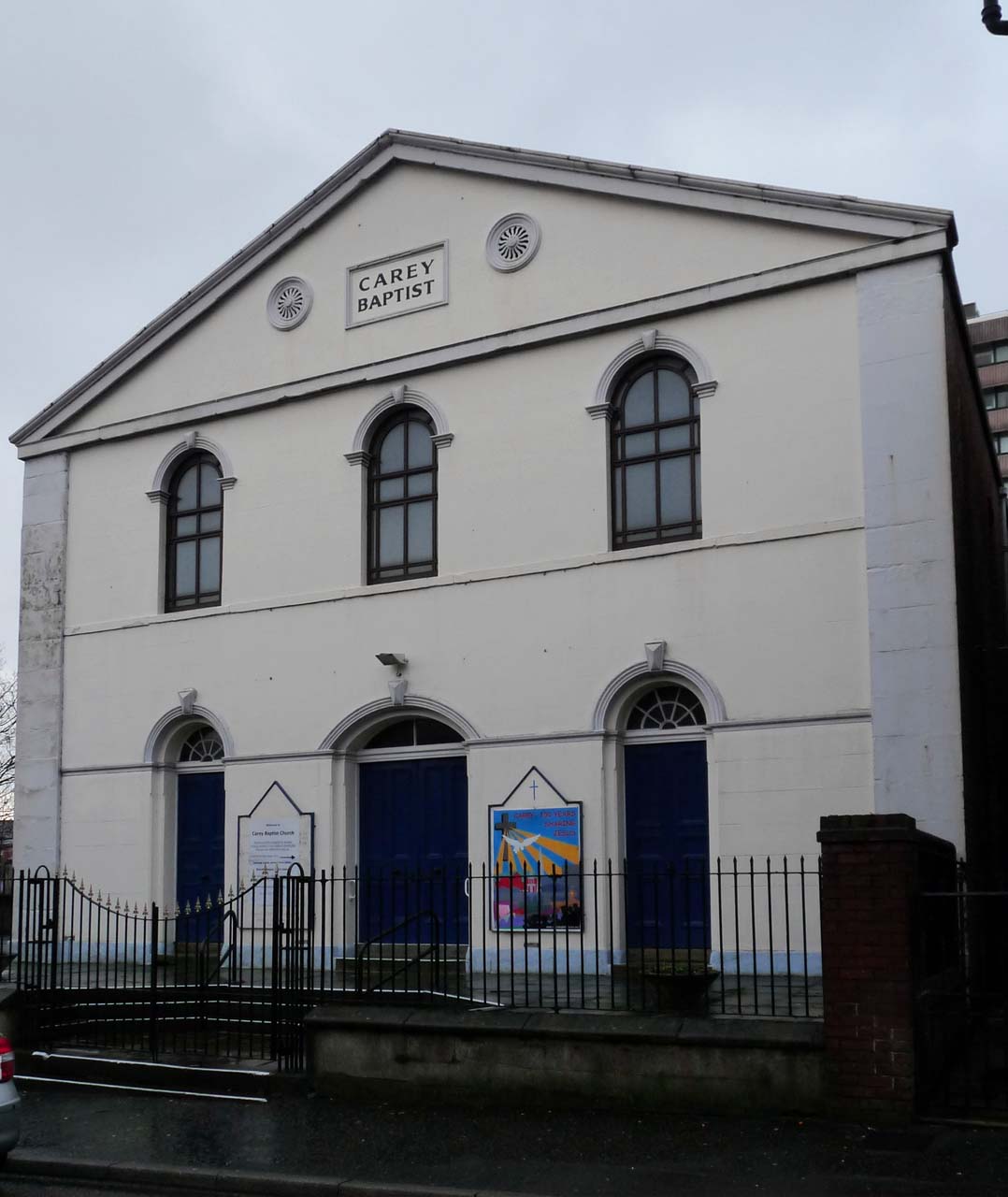 |
Carey Baptist Church, Preston |
 |
Carey Baptist Church
in the Town of Preston
 | |
Photograph supplied by and © of Mike Berrell |
The following is reproduced from "Our Churches and Chapels" by Atticus (A. HEWITSON) and was printed at the "Chronicle" Office, Fishergate, Preston. 1869. The Lancashire Online Parish Clerks Project wish to acknowledge Project Gutenberg who have made this and many other books freely available.
In Pole Street, we come to the Baptist Chapel in that, thoroughfare --arather dull, strongly-railed-off place, which seems to be receding from public sight altogether. About 45 years ago, a small parcel of Preston people, enamoured of the Calvinistic Methodism which the Countess of Huntingdon recognised, worshipped in a building in Cannon-street. In 1825 they built, or had raised for them, a chapel in Pole-street, which was dedicated to St. Mark. At this time, probably on account of its novelty, the creed drew many followers-- the new chapel was patronised by a somewhat numerous congregation, which kept increasing for a period. But it gradually dwindled down, and a total collapse finally ensued. In 1855 a number of General Baptists, who split from their brethren worshipping in the old Leeming-street chapel, struck a bargain with the expiring Lady Huntingdon section for their building in Pole-street, gave about 700 pounds for it, forthwith shifted thereto, and continue to hold the place. There is nothing at all calling for comment as to the exterior of the chapel; and not much as to the interior. It will accommodate about 900 persons. The pews are high, awkward to sit in, and have a grim cold appearance. The building is pretty lofty, and is well galleried. The pulpit is at the far end, and the singers sit on a railed platform before it. The congregation seems both thin and poor. Very lately we were in it, and estimated the number present at 84--rather a small party for a chapel capable of holding 900.
The building possesses about the best acoustical properties of any place of worship in Preston. The late Mr. Samuel Grimshaw, of Preston, who, amongst many other things, had a special taste for music, used to occupy it at times, with his band, for the purposes of "practising." He liked it on account of its excellent sounding qualities. Once, after some practice in it, Mr. Grimshaw offered a "return"--said he would give the brethren a musical lift with his band during some anniversary services to be held in the chapel. His promise was accepted, and when the day came there was a complete musical flood. The orchestra, including the singers, numbered about 50, and the melodious din they created was something tremendous. "Sam" had the arrangement of it. There were tenors, baritones, bass men, trebles, alto-singers, in the fullest feather; there were trumpeters, tromboners, bassooners, ophicleideans, cornet-a-piston players, and many others, all instrumentally armed to the very teeth, and the sensation they made, fairly shook and unnerved the more pious members of the congregation, who protested against the chapel being turned into a "concert-hall," &c. The music after all, was good, and if it were as excellent now there would be a better attendance at the place. The present orchestra consists of perhaps a dozen singers, including a central gentleman who is about the best shouter we ever heard; and they are helped out of any difficulties they may get into by a rather awkwardly-played harmonium.
The Rev. W. J. Stuart is the minister of the chapel, and he receives from 70 to 80 pounds a year for his duties. He has a gentlemanly appearance; looks pretty well considering the nature of his salary; is getting into the grey epoch of life; is not very erudite; but seems well up in scriptural subjects; is sincere, mild, primitive in his notions; has fits of cautiousness and boldness; is precise and earnest in expression; has an "interpretational" tendency in his sacred utterances; is disposed to explain mysteries; likes homilising the people; can talk much; and can be very earnest over it all. He has fair action, and sometimes gets up to 212 degrees in his preaching. We won't say that he is in any sense a wearying preacher; but this we may state, that if his sermons were shorter they would not be quite so long. And from this he may take the hint. We are told that the attendance at the chapel is slightly increasing; but as compared with the past it is still very slender. The admission to either the platform or pulpit of the chapel, not very long ago, of a wandering "Indian chief," and a number of Revivalists, who told strange tales and talked wildly, has operated, we believe, against the place--annoyed and offended some, and caused them to leave. The minister, no doubt, admitted these men with an honest intention; but everybody can't stand the war-whooping of itinerant Indians, nor the sincere ferociousness of Revivalists; and awkward feelings were consequently generated in some quarters by them. In the main, Mr. Stuart is a kindly, quiet, gentlemanly person, and barring the little interruption caused by the dubious Indian and the untamed Revivalists, has got on with a small congregation and a bad salary better than many parsons would have been able to do.
| Preston Home & Contents | ©Lancashire OnLine Parish Clerks | Lancashire Home |